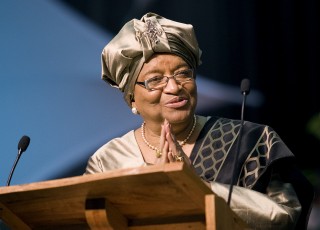Gender parity and female empowerment have become top priorities for Africa. They are also priorities for the UN as seen in the Millennium Development Goals (MDGs) and continue to be integral parts of the Sustainable Development Goals (SDGs). Many women, especially in Africa, have made great strides in economic and political empowerment, but still, too often do women bear the brunt of economic hardship and violence. And more often than not, the women who “struggle” to make it and become pioneers in certain fields of influence tend to stop there, without putting in more effort to further empower more women.
On October 10th, the oldest African republic and first African nation to formally elect a female president – Liberia – will encounter a change in government for the third time after its 14 years long civil war. This change will bring to an end President Ellen Johnson Sirleaf’s constitutionally allowed two terms in office. Though lauded for her great strides in holding the country together and bringing peace back after a dozen long years of civil war, Sirleaf is said to have fallen short in key areas such as fighting corruption and upholding female rights and empowerment in Liberia.
She has done little to nothing to further empower Liberian women – especially in politics – as, in this year’s election, only 163 out of 1,026 (16 percent) approved candidates are women, including one running for president in a packed field of over 20 men. This represents only a marginal increase since 2005 and 2011, when women accounted for 14 percent (110/762) and 11 percent (104/909) of candidates, respectively.
Also, according to UN Women data, Liberia ranks just 146th of 190 countries in terms of women in the legislature —women account for 11.66%. The executive branch consists of 21% women and women account for under 6% of leadership positions in local government, from the village to the county level. The data shows that in this year’s election, just ten of a total of 58 candidates in Sirleaf’s Unity Party are women.
Feminist activist Korto Reeves Williams puts it thus, “Women entering a patriarchal system without having changed it is not much of a success, as opposed to joining a new kind of system that acknowledges that women and men are equal.”
Consequently, this saying doesn’t only apply to Sirleaf as in a slight turn of events, popular Nigerian songstress – Tiwa Savage – has over the past few days received lots of backlash on social media from women (and men) over her comments in an interview that men and women are not equal.
“…I know I’ll (ruffle) a few feathers but I also don’t think men and women are equal. I don’t think that’s how God created us… especially in the household anyway. So I think as females… yeah, we can be strong in our career, but when we are home we have to realise that the man is the head of the house,” Tiwa said.
For a woman, who has encountered some of the hardship that comes with making it in the entertainment industry, voicing out such patriarchal statements gives the wrong impression, thus instigating that struggle for women empowerment and gender parity need not be encouraged.
Tiwa has just been named one of the British Broadcasting Corporations (BBC) most inspirational and influential women of 2017, yet her efforts to uplift and empower women in the entertainment sector has been little or none.
Sirleaf and others like her have demonstrated that a woman’s assumption of the highest political office in a country or highest field of influence does not inevitably result in gender equity. Her legacy on women’s political participation, in particular, is characterised by an individualistic approach that betrays the hard-fought gains made by women’s rights movements across the globe.








